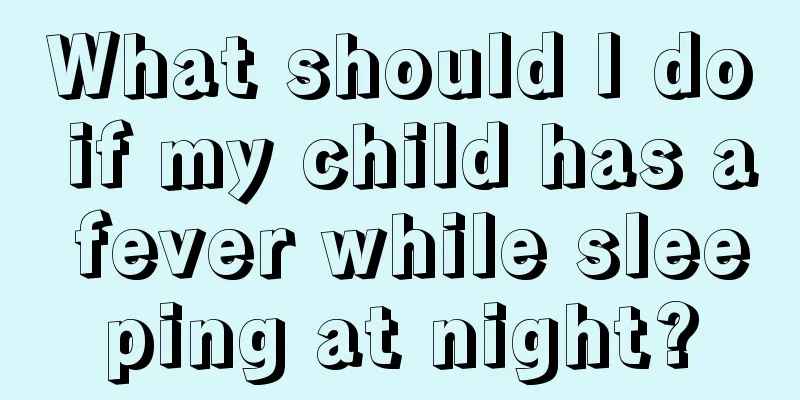What to do if your child has a recurring low-grade fever

|
Parents should never ignore children's repeated low-grade fever, because repeated low-grade fever means that the child's body has inflammation. Therefore, parents must pay attention to it and understand why children have repeated low-grade fever. Find out the cause and treat it as soon as possible. So what should you do if your child has repeated low-grade fever? Let's take a look at the detailed introduction below. We know that the nervous system of infants and young children is not yet fully developed, and they are prone to high fever or have their body temperature rise quickly after taking medicine to reduce the fever. What parents can do is to provide adequate nutrition according to the child's age and physical development, and add complementary foods in a timely, reasonable and balanced manner. After ensuring adequate nutrition, we can actively prevent and treat certain nutritional diseases, such as rickets, which is closely related to the occurrence and treatment of pneumonia. . There are high incidences of diseases in every season, so we should pay attention to the prevention of pneumonia in spring. Of course, a more effective way to prevent disease is to increase one's own resistance, insist on taking children out more often or urging them to participate in outdoor activities, and strengthen physical exercise to enhance their ability to adapt to cold climates. In the living room, doors and windows should be opened more often to allow more air circulation and keep the indoor air fresh. Since bacteria are often transmitted through droplets, when there are people around who have respiratory infections such as colds, try to avoid contact between your children and them to prevent cross infection. Professor Yang especially reminded that children under 5 years old have low immunity, and parents should seek medical attention immediately when their children have symptoms such as coughing and fever. If your child has recurring fever, you need to pay close attention to several key points. If the child's complexion is normal or flushed, you can rest assured to take care of him at home; if his complexion is dull, blue, yellow, or purple, and his eyes are dull, it means that the condition is serious and he should be sent to the hospital. If the child has a high fever but is in good spirits, and can still laugh and play after taking medicine to reduce the fever, and is almost the same as usual, it means that the child's condition is not serious and he or she can be rest assured to recuperate at home. If the child is tired, listless, and has a dull expression, it indicates that the child is seriously ill and should be taken to the hospital immediately. If a child has severe, projectile vomiting, which indicates a brain lesion, the child should go to the hospital. You also need to pay attention to whether your child has abdominal pain and bloody stools. Abdominal pain that does not allow massage indicates acute abdomen, and bloody stools indicate dysentery, etc., and you must go to the hospital. Finally, observe the child's skin. If a rash appears, infectious diseases or drug allergies should be considered first. Check whether the skin turns purple or cools. If so, it indicates circulatory failure. In both cases, you need to go to the hospital again. If your child has the above symptoms, you should take him/her to see a doctor immediately after your initial examination to avoid delaying the treatment. What should you do if your child has recurring fever? As a parent, you must have a comprehensive understanding and knowledge of this aspect and improve your medical knowledge so that you can know how to treat and prevent your child's recurring fever. The above is a detailed introduction, so you can get targeted treatment as soon as possible through the above understanding. |
<<: Why do newborns cry at night?
>>: Basic symptoms of yellow tongue in newborns
Recommend
What are the treatments for tics?
I think a lot of people have had the same experie...
Causes and treatments of loose stools in children
What is the reason for children's loose stool...
What happened if my child suddenly has swelling under his ear?
When a child feels unwell, he or she will definit...
What is the cause of anal bleeding in children's stool?
Blood in the baby's stool is often more serio...
What to do if your child has a fever and stuffy nose
Children's fever is accompanied by nasal cong...
Why does a baby sob when sleeping?
Newborns are the most vulnerable group that deser...
Why are my child's lips turning white?
The color of a child's lips can reflect the h...
How to conservatively treat adenoid hypertrophy in children?
Children's health is an issue that requires c...
Is it normal for a baby to have bilateral ventriculomegaly?
Nowadays, many parents will find that their babie...
What are the symptoms of cerebral palsy in newborns?
What are the symptoms of cerebral palsy in newbor...
What should I do if my child is introverted?
Parents all hope that their children are lively a...
What is the cause of the white spots on the child's body?
If white spots appear on the child's body, pa...
What fruits are better for children with bronchitis?
Once a child's bronchitis attacks, it is ofte...
Baby's hair is bald at the back
A baby is the fruit of a couple's love and is...
Is it better to use a cold towel or a hot towel when a child has a fever?
There is a saying passed down by the elderly: The...









